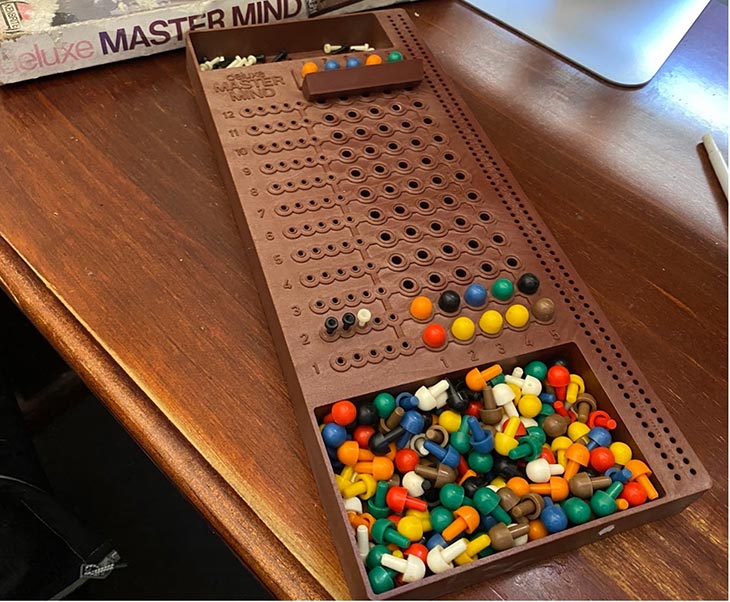Many of us over-50s remember well some of the fads of our childhood. Hula hoops were big in the 1960s and yo-yos had several runs as the ‘in thing’ from the 1950s through to the 1980s. Then came the Rubik’s Cube, the coloured puzzle that drove many of us nuts.
Well, if my Twitter feed of the past few weeks is anything to go by, there’s a new craze taking the world by storm – something called Wordle.
I first became aware of Wordle several weeks ago when little green, yellow and black squares began to pop up in posts all over my Twitter timeline. Back in my childhood, the days of television shows like My Favourite Martian, Star Trek and Lost In Space, all the talk was of “little green men”. Now it seemed to be little green squares.
After seeing a few of these Twitter posts – each featuring a phrase along the lines of “Wordle 204 3/6” followed by several rows of five coloured squares, the last of which was usually entirely green – I realised that they were related to some kind of word puzzle game.
Read: Sudoku for a healthy brain
As a bit of a word puzzle fiend, I was very tempted to see what all the fuss was about and join in the fun. The thing is, though, I tend to get easily hooked on such things, and I already spend too much time online playing Words With Friends and the like.
So for a time I resisted, but the posts from other ‘Wordlers’ (is that what they call themselves?) kept coming, and the pattern of coloured squares began to ring a few bells for me. I noticed the upper rows tended to feature more black (or in some cases grey) and yellow squares, with these gradually replaced by green squares with each successive row until the final row featured a nice row of five green squares.
I figured out that the idea was to guess the nominated five-letter word, and that a green square meant you had guessed the correct letter and placed it in the correct place, yellow meant you had the right letter but in the wrong place and black/grey squares meant the letter you guessed was not part of the five-letter word at all.
Read: Why you should schedule fun into your day
The reason this rang bells for me is that it was basically a word-based version of a game I owned and played as a kid: Master Mind. This was a two-player game that required one person to place four ‘code’ pegs of various colours behind a plastic barrier and their opponent to guess the correct colours and sequence via a series of guesses.
As is the case with Wordle, after each guess the ‘hider’ would let the ‘guesser’ know the number of colours they had correct and how many were in their correct position by placing black and/or white ‘key’ pegs next to the person’s attempt.
I had (and in fact still have) the ‘deluxe’ version of the game, which features five peg places instead of four and eight colours, rather than the six featured in the standard game.

Having had those childhood memories stirred, I caved in to the pressure, and tracked down Wordle online. The good thing about Wordle for a game addict like me is that only one new word is featured each day. Once you’ve done today’s puzzle, that’s it until tomorrow.
The Wordle craze has led to several interesting online phenomena. The first is the simple proliferation of tweets from those eager to share and compare their efforts with others each day.
But not everyone is happy with their timelines being filled with coloured squares.
In fact, so frustrated are some that they have used Twitter’s ‘mute’ function to cleanse their timeline of Wordle posts. Some have quite proudly announced they are doing so, too.
Another Wordle phenomenon I’ve noticed is the rise of what I call the ‘Midnight Cowboys’ (and Cowgirls). These are the Wordle players who feel the need to get stuck into the next game as soon as it becomes available, at the stroke of midnight each night. For ‘early to bed, early to rise’ Wordlers, this must be an extra challenge.
Of course, every fad must have its own little controversy, and Wordle’s came a couple of weeks ago when my timeline was flooded with players complaining they had not cracked the code because that particular day’s word used US spelling. They were all the more incensed because Wordle is a game of UK origin.
Read: Who knew a crossword could do all this?
For the record, the word that stoked these fires of fury was “favor”. Of course, the accepted UK (and Australian) spelling of the word is “favour”. Interestingly, though, this was not always the case. A quick search of Trove, the digitised repository of Australian newspapers, reveals that in the 1890s, “favor” returns 36,000 results for Melbourne’s newspaper The Age, while “favour” returns just 84!
Perhaps like me, the ‘Wordler-General’ is a little bit nostalgic for the olden days.
In the meantime, the Wordle craze is showing no signs of abating, but at some stage in the not-too-distant future, another fad will take us all by storm and Wordle will fall from favor – or should that be favour?
Have you been bitten by the Wordle bug? Or are you sick of being bombarded by Wordle posts? Why not share your experience in the comments section below?
If you enjoy our content, don’t keep it to yourself. Share our free eNews with your friends and encourage them to sign up.

